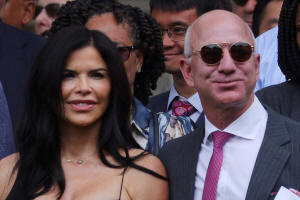|
As next month's COP27 in Egypt approaches, the Bezos Earth Fund
is championing a cause to begin reversing deforestation and land
degradation on 100 million hectares in Africa by 2030, said
Andrew Steer, the philanthropic organization's chief executive.
The so-called AFR100 initiative is led by some African Union
countries.
"African farmers are suffering appallingly from climate change,"
Steer said during the Reuters IMPACT conference in a session
recorded last week. Restoration's goal would be reducing carbon
in the atmosphere and "better incomes for farmers, better food
security, more resilient soils."
Developing countries meanwhile are increasing demands for
wealthier, carbon-emitting nations to pay for climate-induced
disasters like floods and fires.
Asked how the Bezos Earth Fund viewed such reparations, Steer
said: "Rich countries are going to have to play a bigger role on
creating resilience on helping poor countries and poor citizens
to adapt."
Bezos's philanthropic organization so far has pledged 30% of its
$10-billion fund toward nature conservation, restoration and
food-systems transformation. The actual grants it has issued
total to a little over $1.5 billion, a fund spokesperson said.
Bezos, the Amazon.com Inc founder who Forbes estimates to be
worth more than $130 billion, is among a growing cadre of
magnates seeking to address climate change through some of their
wealth. Patagonia's founder Yvon Chouinard recently said he
would hand over the apparel brand to a trust that would dedicate
profits to the crisis.
What partly distinguishes Bezos's fund are principles for its
operation, much like those guiding the bookseller he built into
the world's largest online retailer. Frameworks like "be
obsessive about results" and "focus on people" resemble language
in Amazon's tenet of "customer obsession."
Bezos and partner Lauren Sanchez meet with the fund monthly,
according to Steer. The Amazon founder has prodded the fund to
finance well-articulated ideas for combating climate change,
rather than focus on issues or targets generally, Steer said.
The fund's hopes extend to changing entire sectors. Steer
pointed to steel as an example: under what circumstances would a
steel company turn to costlier green hydrogen for production?
How does that change when car companies are involved? The Earth
Fund has granted $31 million to the Mission Possible Partnership
to plan how to decarbonize such an industry, according to press
releases.
It's "a jigsaw puzzle," Steer said.
(Reporting By Jeffrey Dastin in Palo Alto, Calif.; Editing by
Mark Potter)
[© 2022 Thomson Reuters. All rights
reserved.]
This material may not be published,
broadcast, rewritten or redistributed.
Thompson Reuters is solely responsible for this content.

|
|




